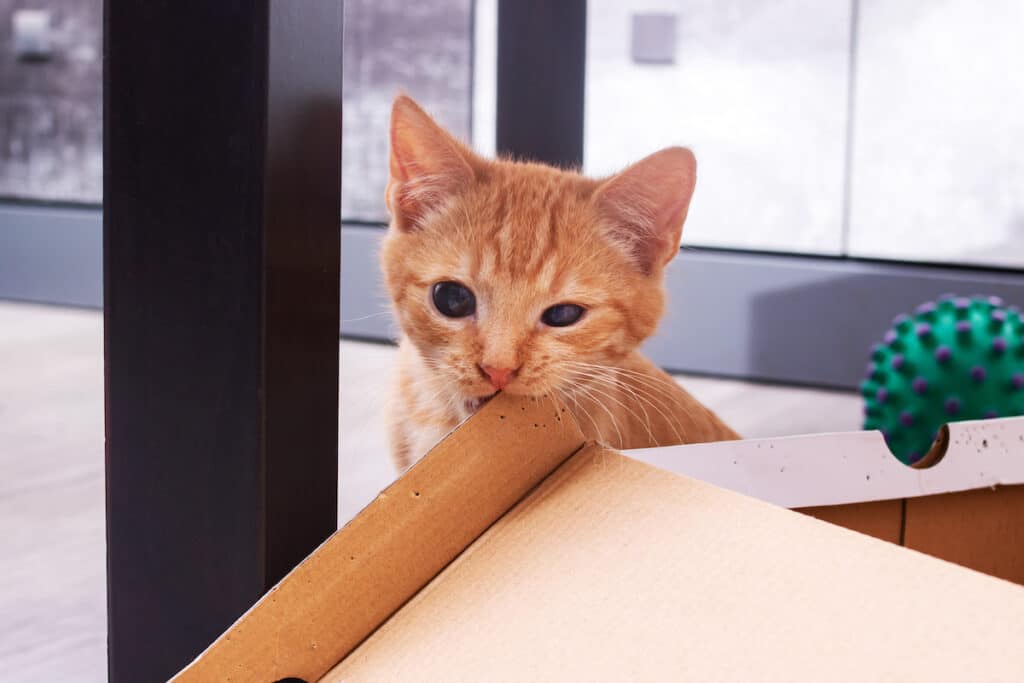While it takes young people years to lose all of their baby teeth and wait for their adult chompers to erupt, the teething process for kittens happens considerably more quickly. Cats really go through two sets of teeth by the time they are six months old.
Kitten Teething: An Age Timeline
Baby teeth, sometimes referred to as milk or deciduous teeth, appear for the first time when a kitten is 3 to 4 weeks old. According to Pet Health Network, the primary canines and incisors come in first, with the rest coming in short succession. By the time a newborn is three to four months old, all of these baby teeth have fallen out, allowing place for the adult teeth to erupt. Usually, by the time a kitten is 6 months old, all of its adult teeth have erupted. The majority of adult cats have 30 adult teeth and 26 baby teeth.
What are the signs of kitten teething?
You might not even be aware that your feline companion is losing teeth while they are teething as a kitten until you spot one on the floor or in their bed. Don’t be concerned; this is usual. Again, there is no reason to worry; it causes no harm to cats to swallow their tiny teeth. These typical indications of kitten teething include:
- Decreased appetite
- Excessive chewing
- sore, red gums
- Slight bleeding of the gums
- Irritability
- Pawing at their mouth
As your cat goes through the teething stage, the experts at Tufts catnip stress the significance of keeping an eye out for indicators of gingivitis or periodontal disease, like as severely swollen or bleeding gums and foul breath. In rare cases, kittens may still have some of their newborn teeth, which is known as persistent deciduous teeth. Even though it’s uncommon, it’s important to watch out for this disease because a tooth extraction might be required. In order to ensure that your cat partner receives the prompt care they require, contact your veterinarian as soon as you become aware of any of these symptoms.
How to Help a Teething Kitten
Are kittens’ teething pains severe? When sharp teeth protrude through delicate gums, there will undoubtedly be some physical discomfort, but according to Greencross Vets, this discomfort is normally mild. However, your kitty will look for ways to stop the pain and irritability that come with teething. It’s never a good idea for either of you if they try to use you as a chew toy. Similar to other instances of violent cat play, redirection is the best course of action here.
A cool, damp towel makes a safe alternative to a chew toy since it gives the mouth something to do after excessive chewing and eases some of the pain. Another choice is to use kitten chew toys that are sold commercially. These include toys that are simple to chew made of rubber or soft plastic and toys that can be stored in the refrigerator. You should always follow the toy’s instructions, keep an eye out for damage, and throw away damaged toys right away to keep your cat safe. You should also supervise them as they play with it.
Your cat can attempt to gnaw on electrical cables or furniture legs. In addition to potentially harming your possessions, this activity may also endanger your cat. Experts at Your Cat advised covering electrical cords and wires with protective plastic covers to prevent unintentional injury from destructive chewing. Additionally, they advise using double-sided tape to surfaces you want to shield from your kitten’s razor-sharp teeth.
The Importance of Good Oral Hygiene for Kittens
Cats frequently develop dental and gum illnesses, but by taking good care of your cat’s teeth when they’re young, you can help avoid some of these problems in the future. To begin with, adopting a dental care regimen that includes routine cleanings and examinations as well as teeth brushing after the teething cycle to prevent further discomfort may help to save health care expenditures and prevent conditions including gingivitis, periodontitis, and tooth resorption. If their gums are painful, teething kittens may prefer canned food or kibble soaked in water. When they grow up, you might think about giving them cat food that is designed to support good oral health.
Make sure to give your cat lots of love, support, and patience when these new teeth erupt because they might not manage the teething process well.














